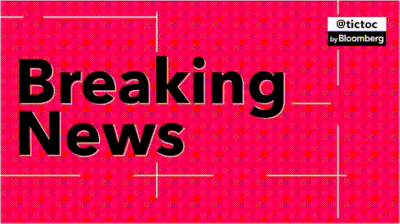You are using an out of date browser. It may not display this or other websites correctly.
You should upgrade or use an alternative browser.
You should upgrade or use an alternative browser.
RUSSIA 🇷🇺 / РОССИЯ THREAD—DJT IMPEACHED TWICE-US TREASURY SANCTS KILIMNIK AS RUSSIAN AGENT—UKRAINE Peace?
- Thread starter ☑︎#VoteDemocrat
- Start date
More options
Who Replied?MerCrimmuh
Pro
Aye Nap, so I'll be honest, every single fukking slimy thing these fukks have done crooked, in my mind, should lead to impeachment and jail. There is so fukking much.
What in your opinion are the 2-3 main threads/crimes/paths of fukkery that will be most likely to clean these fukks out?
What in your opinion are the 2-3 main threads/crimes/paths of fukkery that will be most likely to clean these fukks out?
Jhoon
Spontaneous Mishaps and Hijinks
What if nothing comes of it? How long are we willing to wait for indictments?So who's watching the courts tomorrow?
The WaPo Scoop on the DNC Hack (Temporarily) Killed the Trump Tower Deal | emptywheel
THE WAPO SCOOP ON THE DNC HACK (TEMPORARILY) KILLED THE TRUMP TOWER DEAL
February 5, 2019/57 Comments/in 2016 Presidential Election, Mueller Probe /by emptywheel
On June 14, 2016, Felix Sater was getting stressed about putting together Michael Cohen’s trip to St. Petersburg at which, on June 17, Donald Trump’s personal lawyer might meet Vladimir Putin, which would in turn lead to a $300 million real estate deal. He bugged Cohen in the morning to get back to him.
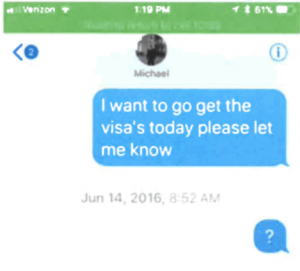
At 10:24 AM, Sater sent Cohen the invitation he would need to get a Russian visa in one day’s time.
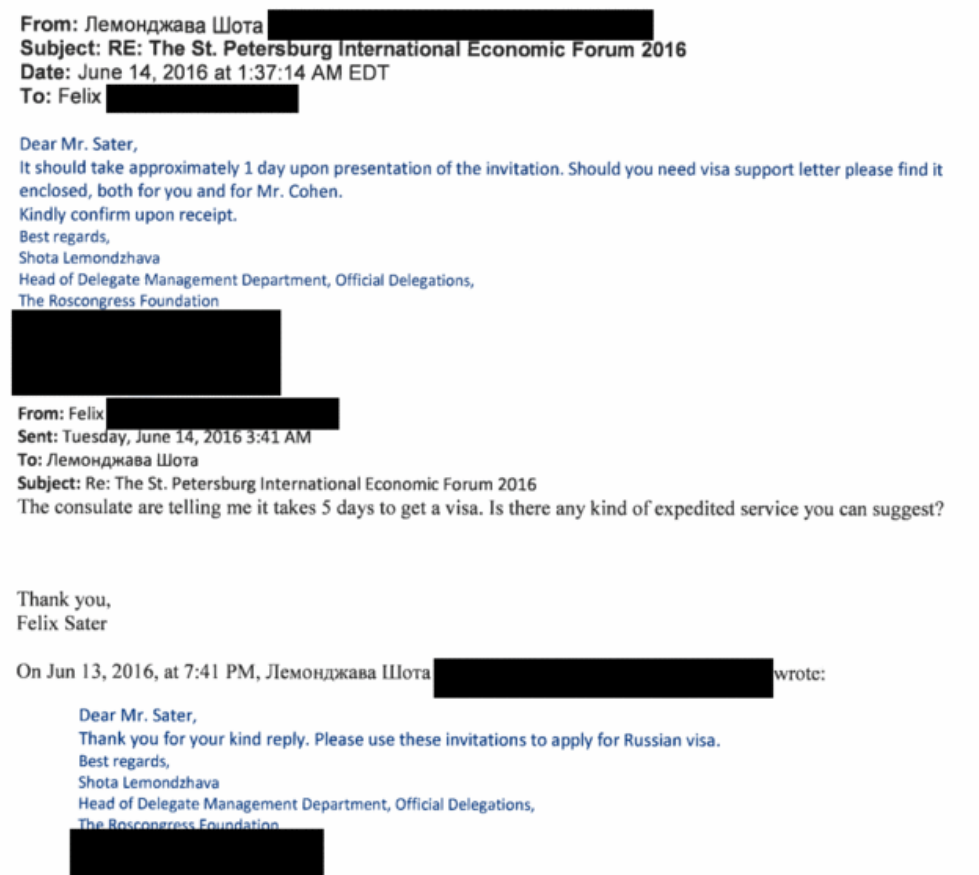
At around 11:35 AM, the Washington Post reported that Russian hackers had hacked the DNC.
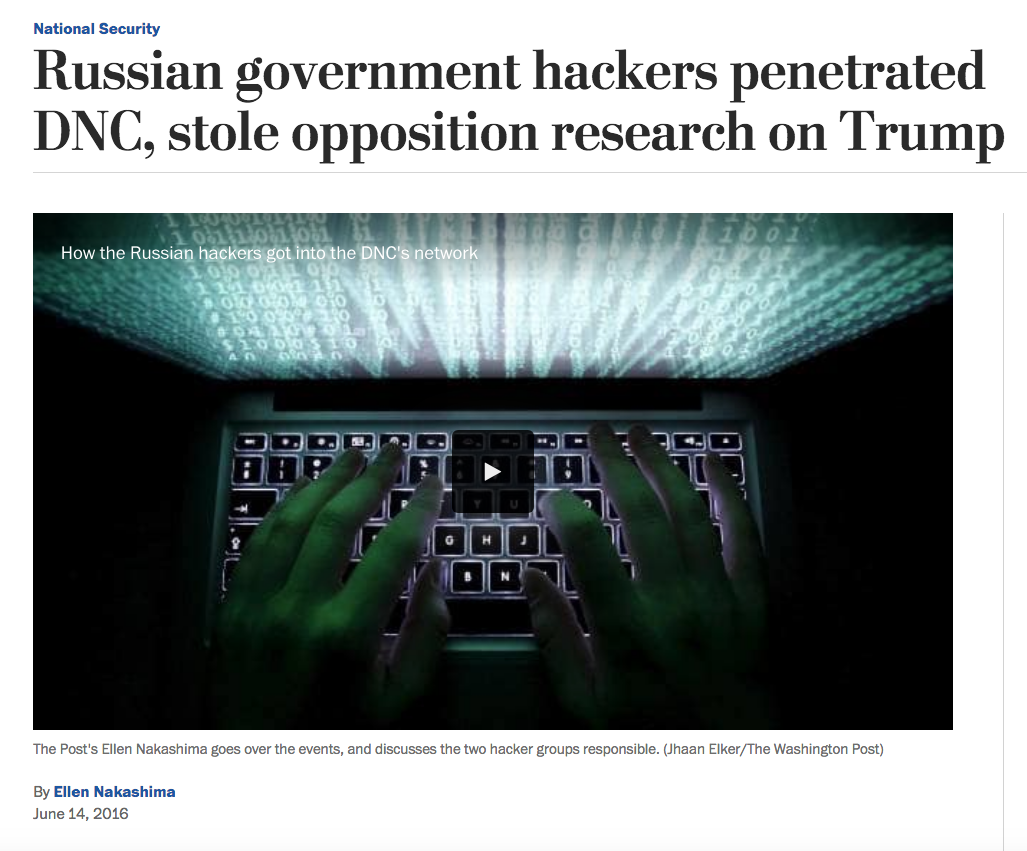
Things still seemed to be ready to go at 12:06 PM. Sater texted Cohen, “you are radio silent, please respond.” Cohen called him just after noon.
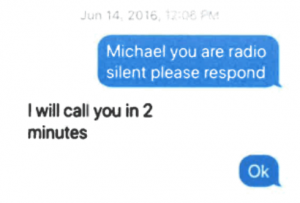
But by 2:41 PM, when Sater showed up at Trump Tower to get the paperwork, Cohen wouldn’t let him come upstairs. Instead, he met him downstairs in the snack bar.
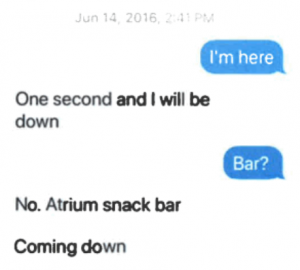
Three days before Donald Trump’s personal lawyer would have met with Vladimir Putin to advance a $300 million Tower deal, he instead met his fixer in the lobby and told him, “he would not be traveling at that time.”
THE WAPO SCOOP ON THE DNC HACK (TEMPORARILY) KILLED THE TRUMP TOWER DEAL
February 5, 2019/57 Comments/in 2016 Presidential Election, Mueller Probe /by emptywheel
On June 14, 2016, Felix Sater was getting stressed about putting together Michael Cohen’s trip to St. Petersburg at which, on June 17, Donald Trump’s personal lawyer might meet Vladimir Putin, which would in turn lead to a $300 million real estate deal. He bugged Cohen in the morning to get back to him.

At 10:24 AM, Sater sent Cohen the invitation he would need to get a Russian visa in one day’s time.

At around 11:35 AM, the Washington Post reported that Russian hackers had hacked the DNC.

Things still seemed to be ready to go at 12:06 PM. Sater texted Cohen, “you are radio silent, please respond.” Cohen called him just after noon.

But by 2:41 PM, when Sater showed up at Trump Tower to get the paperwork, Cohen wouldn’t let him come upstairs. Instead, he met him downstairs in the snack bar.

Three days before Donald Trump’s personal lawyer would have met with Vladimir Putin to advance a $300 million Tower deal, he instead met his fixer in the lobby and told him, “he would not be traveling at that time.”
GnauzBookOfRhymes
Superstar
it's details like this that make me discount any theory based on "he got in over himself!"
didn't even let the mfer into the office...imagine that, a guy who probably basically lived out of that office for years
didn't even let the mfer into the office...imagine that, a guy who probably basically lived out of that office for years
Judgment Time Has Come 

Poetical Poltergeist
Precise and cold hearted
Judgment Time Has Come

Elections have consequences.
 Trump had his fun for 2 years, now the lube is ready.
Trump had his fun for 2 years, now the lube is ready. 
Sergei Millian, identified as an unwitting source for the Steele dossier, sought proximity to Trump’s world in 2016

Around the time of President Trump’s inauguration, two of his supporters met to toast the new administration at the Russia House, a Washington restaurant known among Russian diplomats and emigres for its vodka and caviar.
The Dupont Circle spot was suggested by Sergei Millian, according to onetime Trump foreign policy adviser George Papadopoulos, who said he met with the Belarus-born businessman there.
The get-together followed months of outreach Millian had made to the young aide — including offering him a lucrative consulting contract to work simultaneously for Trump and an unidentified Russian, which Papadopoulos said he rebuffed. FBI agents later pressed Papadopoulos about his relationship with Millian, Papadopoulos’s lawyers have said.
The interactions between the two men — the extent of which have not been reported previously — show how Millian, a self-described real estate developer who served as an unwitting source of information for former British spy Christopher Steele, was in closer proximity to Trump’s world than previously known.
As he was working to build a relationship with Papadopoulos in 2016, Millian also offered to serve as a conduit to the Trump campaign for a Belarusan author in Florida with connections to the Russian government, according to emails obtained by The Washington Post.
The author, Mikhail Morgulis, who said he never ended up hearing from anyone in the campaign, later claimed that he rallied Russian Americans to back Trump.
The new details deepen the persistent mystery surrounding Millian, two years after he was identified as one of the unnamed sources in a campaign dossier Steele compiled for Democrats about Trump’s ties to Russia.
At the time, little was known about Millian’s connection to the New York developer, other than the fact that he said he had sold units at a Trump property in Florida years ago.
Millian, who has denied being a source for the dossier, has largely disappeared from public view, despite efforts by congressional investigators to interview him — taking with him potential answers about the president’s links to Russia and some of the dossier’s still-unproved claims.
The House and Senate intelligence committees have tried to interview Millian, according to people familiar with the panels’ work. Millian did not respond to the Senate committee, one person said. In a report issued last year, House Democrats said that Millian was unwilling to appear before their panel without being granted immunity and they called on Republicans to subpoena him. Now back in majority control, House Democrats said they plan to renew efforts to obtain his testimony.
Businessman Sergei Millian is said to be the man behind one of the most salacious claims in the dossier on President Trump's involvement with Russia (Sarah Parnass/The Washington Post)
“Sergei Millian remains someone of deep interest to our investigation,” said Rep. Adam B. Schiff (Calif.), the new chairman of the House Intelligence Committee, citing Millian’s “opaque business and personal history” and interactions with Papadopoulos.
It is unknown whether Millian has been interviewed by special counsel Robert S. Mueller III, who is investigating Russian interference in the 2016 presidential campaign. A spokesman for Mueller declined to comment.
Millian, whose social media posts in recent months have included images recycled from years-old events, did not respond to requests for comment.
His exact role in Trump’s world remains elusive.
Was he a business associate with an insider’s perspective on the candidate’s business adventures in Moscow? A self-promoting braggart spinning false tales? A Russian intelligence operative?
Papadopoulos said he thinks Millian was working with the FBI to target the Trump campaign. But two people familiar with the FBI’s Russia investigation said that Millian was not working with the bureau during his interactions with Papadopoulos.
An FBI spokeswoman declined to comment.
An acquaintance of Millian who exchanges texts with him and thinks he has been unfairly targeted by the media says he thinks Millian lives in New York, but is not sure.
“One time he sent me a photo. He was in Europe somewhere. He was on some bridge,” said Jeff Jetton, a Washington restaurateur and writer who befriended Millian shortly after his role in the dossier became public. “I don’t really question him about where he is. He doesn’t question me about where I am. I don’t really care.”
A meeting at a horse track
Millian, now 40, came to Steele’s attention after the firm Fusion GPS hired the former British intelligence officer in June 2016 to research Trump’s business history in Russia on behalf of Democrat Hillary Clinton’s presidential campaign.
Born in Belarus and given the name Siarhei Kukuts, Millian went to college in Minsk, where a Russian-language version of his biography that he posted online said he trained to be a military translator.
He moved to Atlanta in the early 2000s, changed his name to Sergei Millian, and began working in real estate and professional translating, according to friends at the time and his biography. There, he founded a trade group called the Russian American Chamber of Commerce in the USA, which gave him a platform to interact with business and government leaders in the United States and Russia.
It also boosted Millian’s profile. In 2011, he was invited to take part in a Russian government-backed effort to bring American entrepreneurs on visits to Moscow. The Post has previously reported that the FBI later investigated the trips as possible influence operations linked to Russian intelligence, although Millian was never implicated.
In his organization’s literature and elsewhere, Millian boasted of a relationship with Trump, saying that he had been engaged to sell apartments to rich Russians in the Trump Hollywood condo building in Florida.
On Facebook and in literature for his Russian chamber of commerce, he posted a photo of himself with Trump, snapped at a horse track in Miami in 2007 after he said “mutual associates” introduced them. It is unclear whether they met on any other occasion.
But in April 2016, Millian gave the Russian state-operated news organization RIA Novosti an eyebrow-raising interview. He claimed that after meeting Trump in Miami he went to New York and met Trump’s “right-hand man” — his personal lawyer Michael Cohen — and then signed a contract to sell Trump units in Florida.

“You can say that I was their exclusive broker,” he said, speaking in Russian. “Back then, in 2007-2008, Russians by the dozens were buying apartments in Trump’s buildings in the USA.”
Asked in the Russian interview how often he spoke to Trump or his associates, Millian responded: “The last time was several days ago.”
In an interview in 2016 with ABC News, Millian claimed to have high-level contacts in the Russian government. He said he was “absolutely not” affiliated with Russian intelligence.
Cohen has denied meeting Millian and extending him a contract to sell Trump-branded condos. He said in a 2017 interview with The Post that Millian was a fraud who had no substantive connection to Trump or his company, and that the Miami photo was no different from hundreds that Trump took with fans each year.
“He is a total phony,” Cohen said at the time. “Anything coming out of this individual’s mouth is inaccurate and purely part of some deranged interest in having his name in the newspaper.”
Last year, Cohen pleaded guilty to lying to Congress about his efforts to build a Trump Tower in Moscow during the campaign, as well as to bank fraud and to campaign finance violations. As part of his plea deal, he agreed to provide information to Mueller.
Cohen’s spokesman, Lanny Davis, declined to comment about Millian.
The Post has previously reported that in his research reports, Steele described Millian — who was identified in one report as “Source D” and in another as “Source E” — as a “close associate of Trump” who had given a “compatriot” information in confidence in late July 2016.
The information attributed to Millian included the dossier’s most prurient claim: that Trump cavorted with prostitutes in Moscow. The document also cited Millian as a source for the assertion that a “well developed conspiracy of cooperation” existed between the Trump campaign and Russian leaders.
Steele has declined to discuss his sources.
Last edited:
PART 2:
 Christopher Steele, a former MI6 agent who compiled a dossier on Donald Trump, is pictured in London on March 7, 2017. (Victoria Jones/PA/Associated Press)
Christopher Steele, a former MI6 agent who compiled a dossier on Donald Trump, is pictured in London on March 7, 2017. (Victoria Jones/PA/Associated Press)
Trump has repeatedly denied those allegations and denounced the dossier as “phony stuff” cooked up by Democrats to frame his campaign.
Millian has insisted that he is a victim of Trump’s enemies and the news media. He has said he was not a source for information that Steele collected.
“I want to say that I don’t have any compromising information, neither in Russia nor in the United States, nor could I have,” he said in a 2017 appearance on Russian television. “Without a doubt it is a blatant lie and an effort of some people — it’s definitely a group of people — to portray [Trump] in a bad light using my name.”
He has declined to answer detailed questions from The Post and other news organizations about his relationship with Trump or his activities during the campaign.
'The meeting will be strictly confidential'
Emails obtained by The Post indicate that Millian offered to help a Russian emigre seeking to rally support for Trump’s election.
The messages were exchanged between Millian and Morgulis, a Soviet-born author and theologian who broadcast Christian-themed radio programs into the Soviet Union after moving to the United States in the 1980s.
Now living in Florida, Morgulis leads a Christian ministry and serves as honorary consul of Belarus, Millian’s home country and a former Soviet state closely aligned with President Vladimir Putin’s Russia.
Morgulis served from 2014 to 2018 on the coordinating council of a group called the Russian Community Council of the USA, according to Elena Branson, its chairwoman. She said the group is a nonprofit cultural enrichment organization for Russian emigres living in the United States. The Russian Foreign Ministry sometimes reimburses members who travel to conferences or other events, Branson said.
In a July 2016 email exchange, Millian told Morgulis that he would soon be meeting with Trump’s campaign and offered to pass along messages.
“The meeting will be strictly confidential, I won’t be able to invite you to it. If you want me to pass them any information, I will do it, and if they get interested, I will ask them to meet with you,” Millian wrote to Morgulis in Russian.
“Maybe the main thing for them is this,” Morgulis responded. “We can organize the Russian community to vote for Trump. If you are interested in getting 5 million people, I am ready to participate in this campaign, together with you.”
A Trump campaign spokesman did not respond to a request for comment.
The emails were provided to The Post anonymously by a person who claimed to represent a group monitoring Russian activities against Ukraine and declined to say how they were obtained. Morgulis confirmed their authenticity, saying he thought his private correspondence had been stolen.
Morgulis told The Post in an email that he is a Republican who supported Trump but that he never heard from anyone in the campaign about his proposal to organize the Russian-born community.
He said he has known Millian for about seven or eight years, since the younger businessman contacted him when he was living in Atlanta. During the campaign, Morgulis said that Millian said he had become “close to the Trump campaign, since he knew someone in Trump’s group.” But Morgulis said he was skeptical that Millian had any influence on Trump’s operation.
“His political weight was too insignificant,” he wrote in Russian. “It was a character trait of Sergei’s that he liked to make himself out to be a more important person than he was in reality. . . . He is too weak a swimmer to catch any political crocodiles.”
After the election, Morgulis took credit in interviews with Russian media for helping to elect Trump by organizing Russian-speaking voters.
“I personally visited 11 cities in Florida, where I said that if you want our new president to be a homosexual . . . vote for Hillary,” he said a July 2017 interview with the Russian government-funded outlet Sputnik, touting a false claim popular among some conservative conspiracy theorists. In the interview, he also said he had briefly met both Trump and his son-in-law, Jared Kushner.
Morgulis declined to comment on those claims.
Jay Sekulow, a lawyer for Trump, and Abbe Lowell, a lawyer for Kushner, declined to comment.
'An enticing offer'
Around the same time he was in contact with Morgulis, Millian was also seeking to build a relationship with Papadopoulos, a young energy consultant and foreign policy adviser to Trump who had been urging the candidate to meet with Putin.
Papadopoulos had helped trigger the initial counterintelligence investigation of the Trump campaign when he told an Australian diplomat that a London contact relayed to him that the Russians had thousands of emails that could be damaging to Clinton.
Papadopoulos said that he first heard from Millian on July 22, 2016 — the same day WikiLeaks published hacked Democratic Party emails.
In that note, Millian described himself as a Trump adviser and offered to help explain the U.S.-Russia relationship, Papadopoulos said.
The two struck up an online correspondence and met several times, Papadopoulos said. Millian claimed to be a business associate of the candidate and told Papadopoulos that he had connections at Bashneft, a Russian energy company that he said was looking for American investors.
 George Papadopoulos arrives at federal court for sentencing on Sept. 7 in Washington. (Oliver Contreras/For The Washington Post)
George Papadopoulos arrives at federal court for sentencing on Sept. 7 in Washington. (Oliver Contreras/For The Washington Post)
By October, Papadopoulos said Millian approached him with an idea: He said he could get Papadopoulos a public relations contract with a New York firm connected to an unidentified Russian national. The job would pay $30,000 a month, Millian told him.
“It was an enticing offer,” Papadopoulos said. He said he was clear with Millian from the start that he would not work for any Russian under U.S. sanctions.
In the fall of 2016, Millian flew to Chicago, where Papadopoulos was living at the time, to discuss the proposal. The two met at the bar of the Trump International Hotel.
Papadopoulos said that Millian seemed nervous during the meeting. He was pacing, sweating and wearing a scarf around his neck, even though they were indoors.
Then, Millian explained that the job would require Papadopoulos to continue to work for Trump after the election.
“He said, ‘You know, George, in Russia it’s very common for people to work both in the private and public sector at the same time,’ ” Papadopoulos recalled Millian telling him.
Papadopoulos said he knew the offer was unethical — and possibly illegal. “I told him, ‘Absolutely not,’ ” Papadopoulos recalled.
Later, Papadopoulos said he concluded that the meeting may have been a setup — perhaps, he thought, by the FBI, which he learned had arranged for one of its confidential sources, a Cambridge University professor, to meet with him that fall.
He said his suspicions were deepened over drinks during the inauguration at Russia House.
Millian, he said, was accompanied by a friend from Atlanta, a Moroccan American music producer named Aziz Choukri, who Papadopoulos said announced that Millian had been working for the FBI. Papadopoulos said Millian looked sheepish.
In an interview, Choukri said he recalled having drinks with Papadopoulos and Millian but insisted that he never said anything about the FBI. “I never mentioned that,” he said. “It’s a lie.’’
The Daily Caller first reported that Papadopoulos met with Millian and Choukri around the inauguration.
A week after the Russia House gathering, FBI agents showed up at Papadopoulos’s apartment in Chicago to question him about his contacts with Russians. Agents first told the young aide that they were primarily interested in his relationship with Millian, Papadopoulos’s lawyers have said.
In September, one week before Papadopoulos was sentenced to 14 days in prison for lying to the FBI, Millian tweeted some news: He had launched a GoFundMe account to raise money to help him “protect our constitutional rights and fight against censorship!”
Titled “Friends and Enemies of Donald Trump,” the page featured the 2007 photo of Millian and Trump at the racetrack in Miami.
“The Fake News consortiums are active members of the Deep State who tread on our constitutional rights. Let us stand together to protect our Constitution!” he wrote in a long post.
“This page will serve as an assessment if the public is interested and ready to handle the truth no matter where it leads to from a first-hand account,” he continued.
The account carried a goal of raising $1 million. As of Wednesday evening, no donations had been recorded.
Alice Crites, Philip Rucker, Ellen Nakashima and Matt Zapotosky in Washington and Natalia Abbakumova and Anton Troianovski in Moscow contributed to this report.

Trump has repeatedly denied those allegations and denounced the dossier as “phony stuff” cooked up by Democrats to frame his campaign.
Millian has insisted that he is a victim of Trump’s enemies and the news media. He has said he was not a source for information that Steele collected.
“I want to say that I don’t have any compromising information, neither in Russia nor in the United States, nor could I have,” he said in a 2017 appearance on Russian television. “Without a doubt it is a blatant lie and an effort of some people — it’s definitely a group of people — to portray [Trump] in a bad light using my name.”
He has declined to answer detailed questions from The Post and other news organizations about his relationship with Trump or his activities during the campaign.
'The meeting will be strictly confidential'
Emails obtained by The Post indicate that Millian offered to help a Russian emigre seeking to rally support for Trump’s election.
The messages were exchanged between Millian and Morgulis, a Soviet-born author and theologian who broadcast Christian-themed radio programs into the Soviet Union after moving to the United States in the 1980s.
Now living in Florida, Morgulis leads a Christian ministry and serves as honorary consul of Belarus, Millian’s home country and a former Soviet state closely aligned with President Vladimir Putin’s Russia.
Morgulis served from 2014 to 2018 on the coordinating council of a group called the Russian Community Council of the USA, according to Elena Branson, its chairwoman. She said the group is a nonprofit cultural enrichment organization for Russian emigres living in the United States. The Russian Foreign Ministry sometimes reimburses members who travel to conferences or other events, Branson said.
In a July 2016 email exchange, Millian told Morgulis that he would soon be meeting with Trump’s campaign and offered to pass along messages.
“The meeting will be strictly confidential, I won’t be able to invite you to it. If you want me to pass them any information, I will do it, and if they get interested, I will ask them to meet with you,” Millian wrote to Morgulis in Russian.
“Maybe the main thing for them is this,” Morgulis responded. “We can organize the Russian community to vote for Trump. If you are interested in getting 5 million people, I am ready to participate in this campaign, together with you.”
A Trump campaign spokesman did not respond to a request for comment.
The emails were provided to The Post anonymously by a person who claimed to represent a group monitoring Russian activities against Ukraine and declined to say how they were obtained. Morgulis confirmed their authenticity, saying he thought his private correspondence had been stolen.
Morgulis told The Post in an email that he is a Republican who supported Trump but that he never heard from anyone in the campaign about his proposal to organize the Russian-born community.
He said he has known Millian for about seven or eight years, since the younger businessman contacted him when he was living in Atlanta. During the campaign, Morgulis said that Millian said he had become “close to the Trump campaign, since he knew someone in Trump’s group.” But Morgulis said he was skeptical that Millian had any influence on Trump’s operation.
“His political weight was too insignificant,” he wrote in Russian. “It was a character trait of Sergei’s that he liked to make himself out to be a more important person than he was in reality. . . . He is too weak a swimmer to catch any political crocodiles.”
After the election, Morgulis took credit in interviews with Russian media for helping to elect Trump by organizing Russian-speaking voters.
“I personally visited 11 cities in Florida, where I said that if you want our new president to be a homosexual . . . vote for Hillary,” he said a July 2017 interview with the Russian government-funded outlet Sputnik, touting a false claim popular among some conservative conspiracy theorists. In the interview, he also said he had briefly met both Trump and his son-in-law, Jared Kushner.
Morgulis declined to comment on those claims.
Jay Sekulow, a lawyer for Trump, and Abbe Lowell, a lawyer for Kushner, declined to comment.
'An enticing offer'
Around the same time he was in contact with Morgulis, Millian was also seeking to build a relationship with Papadopoulos, a young energy consultant and foreign policy adviser to Trump who had been urging the candidate to meet with Putin.
Papadopoulos had helped trigger the initial counterintelligence investigation of the Trump campaign when he told an Australian diplomat that a London contact relayed to him that the Russians had thousands of emails that could be damaging to Clinton.
Papadopoulos said that he first heard from Millian on July 22, 2016 — the same day WikiLeaks published hacked Democratic Party emails.
In that note, Millian described himself as a Trump adviser and offered to help explain the U.S.-Russia relationship, Papadopoulos said.
The two struck up an online correspondence and met several times, Papadopoulos said. Millian claimed to be a business associate of the candidate and told Papadopoulos that he had connections at Bashneft, a Russian energy company that he said was looking for American investors.

By October, Papadopoulos said Millian approached him with an idea: He said he could get Papadopoulos a public relations contract with a New York firm connected to an unidentified Russian national. The job would pay $30,000 a month, Millian told him.
“It was an enticing offer,” Papadopoulos said. He said he was clear with Millian from the start that he would not work for any Russian under U.S. sanctions.
In the fall of 2016, Millian flew to Chicago, where Papadopoulos was living at the time, to discuss the proposal. The two met at the bar of the Trump International Hotel.
Papadopoulos said that Millian seemed nervous during the meeting. He was pacing, sweating and wearing a scarf around his neck, even though they were indoors.
Then, Millian explained that the job would require Papadopoulos to continue to work for Trump after the election.
“He said, ‘You know, George, in Russia it’s very common for people to work both in the private and public sector at the same time,’ ” Papadopoulos recalled Millian telling him.
Papadopoulos said he knew the offer was unethical — and possibly illegal. “I told him, ‘Absolutely not,’ ” Papadopoulos recalled.
Later, Papadopoulos said he concluded that the meeting may have been a setup — perhaps, he thought, by the FBI, which he learned had arranged for one of its confidential sources, a Cambridge University professor, to meet with him that fall.
He said his suspicions were deepened over drinks during the inauguration at Russia House.
Millian, he said, was accompanied by a friend from Atlanta, a Moroccan American music producer named Aziz Choukri, who Papadopoulos said announced that Millian had been working for the FBI. Papadopoulos said Millian looked sheepish.
In an interview, Choukri said he recalled having drinks with Papadopoulos and Millian but insisted that he never said anything about the FBI. “I never mentioned that,” he said. “It’s a lie.’’
The Daily Caller first reported that Papadopoulos met with Millian and Choukri around the inauguration.
A week after the Russia House gathering, FBI agents showed up at Papadopoulos’s apartment in Chicago to question him about his contacts with Russians. Agents first told the young aide that they were primarily interested in his relationship with Millian, Papadopoulos’s lawyers have said.
In September, one week before Papadopoulos was sentenced to 14 days in prison for lying to the FBI, Millian tweeted some news: He had launched a GoFundMe account to raise money to help him “protect our constitutional rights and fight against censorship!”
Titled “Friends and Enemies of Donald Trump,” the page featured the 2007 photo of Millian and Trump at the racetrack in Miami.
“The Fake News consortiums are active members of the Deep State who tread on our constitutional rights. Let us stand together to protect our Constitution!” he wrote in a long post.
“This page will serve as an assessment if the public is interested and ready to handle the truth no matter where it leads to from a first-hand account,” he continued.
The account carried a goal of raising $1 million. As of Wednesday evening, no donations had been recorded.
Alice Crites, Philip Rucker, Ellen Nakashima and Matt Zapotosky in Washington and Natalia Abbakumova and Anton Troianovski in Moscow contributed to this report.
Last edited:
Millian out here doing deep cover intelligence work 

Cat piss martini
Veteran
GnauzBookOfRhymes
Superstar
what do you honestly think would be the reaction if a grainy tape showing trump in a hotel room watching some girls pee on a bed is actually released?
do you think he'd just deny it was him?
i feel like that's the only thing he could do...
do you think he'd just deny it was him?
i feel like that's the only thing he could do...
